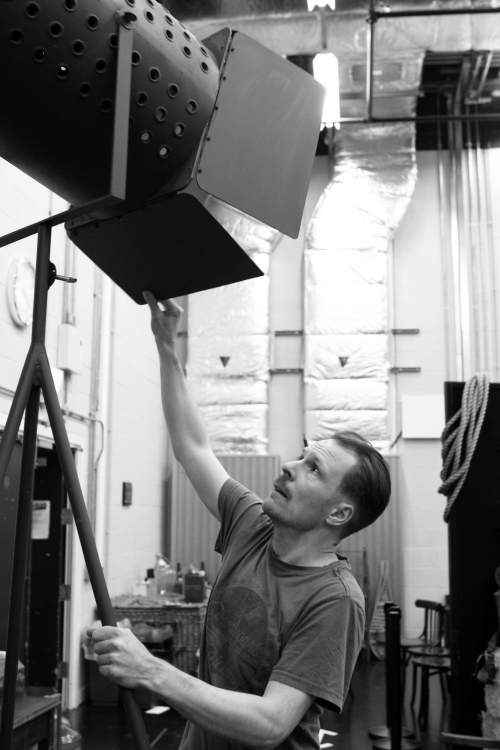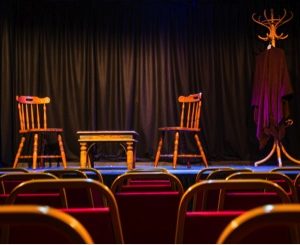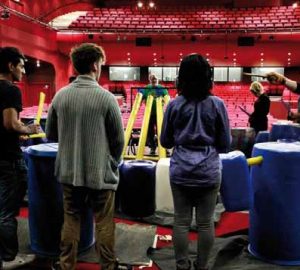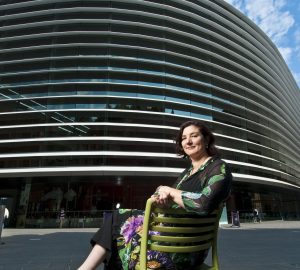
As the city emerges from lockdown, the impact that the pandemic has had on the arts and cultural sector is undeniable. But Nikolai Foster, artistic director of Leicester theatre Curve, feels we all have a role to play in reviving the diverse, cultural undercurrent of Leicester.
Reflecting on the pandemic, he explains: “There genuinely were points over the last 18 months where we weren’t sure if at the end of this, there would be a theatre standing on Rutland Street and if Curve would survive,” he explains. “Our hope is that audiences will come back. You know, because that habit of going to your local theatre is now broken… and people are used to watching TV or staying at home and I think it’s so important that we’re coming back into our city.”
It’s apparent from chatting with Nikolai, who was born in Copenhagen and raised in Yorkshire, that he loves now living in Leicester. He moved here seven years ago to begin his role at Curve and feels the city gave him a warm welcome. “It’s such a welcoming, kind, open-hearted city and now I sort of feel like I belong in Leicester,” he says, adding: “The thing that first struck me about Leicester… it has the ambition and it has the scale of a city but we can walk across it in 15 minutes.” Nikolai also loves the intimacy of living within a tight-knit community: “People know each other, people care about each other and we care about our industries and our businesses and our communities and we care what happens to each other… That’s a beautiful thing”.
Coming from humble beginnings, Nikolai says that theatre and the arts wasn’t something that regularly featured in his upbringing. He admits that his life could have panned out in a completely different direction. “Growing up in Yorkshire, it was very rural and so I was always getting into trouble with the local farmers and running across their fields and what not. But one of the farmers had horses and I started getting into horse riding and that really became a passion and so mid-way through my teens I was an avid horse rider and I was determined to go off and be a jockey — a professional show-runner”. However, after a harrowing experience of being bullied, he found refuge in after-school drama clubs. Of the experience, he explains: “That was humiliating and at times, terrifying. It was a period of two years where it was very, very intense. Theatre and coming out of that really was lifesaving.”
Despite being supportive, Nikolai’s desire to go into theatre was something that worried his mum. “My mum was incredibly anxious… Like any parent if their child is talking about theatre or the arts, it’s a sort of – I think it’s quite a nebular, sort of weird world anyway if you’re not in it or connected with it or it can seem quite abstract”. But given his harrowing experience of being bullied, she came round to the idea: “I think at the time when I got into theatre, I was very badly bullied at school and theatre, and having the after-school drama club, being able to find confidence to speak and to express myself through that… I think my mum understood that it was such a wonderful thing.”
After developing a passion for theatre, he initially directed it towards the most visible aspect of what he had come to love: acting. “I never really imagined there were directors and lighting directors and stage managers, and so I assumed that I wanted to be an actor.” Following what he thought was his lifetime passion, Nikolai enrolled in a drama school but some time into his training, it became apparent to him and those around him that he had begun branching into a different direction. “I was sort of writing mini sketches for my mates and my drama colleagues and I was bringing projects together and I was interested in the lighting.”

After this revelation, Nikolai continued his education in acting however, in his third year as a student he specialised in directing and began to work closely with people who already had experience in the role. It’s likely that this education helped propel him to the helm of one of the UK’s leading theatres so it seems natural now, that he uses his platform to fight against the erosion of the arts in British schools. “I worry today that arts education and arts funding is an ever-diminishing thing… Obviously it’s something we fight for at Curve and will continue to advocate for,” he maintains. However, although Nikolai keenly expresses his love for his busy career, after lockdown brought productions to a grinding halt, he was forced to be introspective about his work-life balance: “I realised quite early on that I am defined by my work and [Curve] is my life… So suddenly for that to stop, there was a bit of an identity crisis because you suddenly realise that actually, ‘I probably need to get a bit of a life outside of work!’” He explains, adding: “There was a moment where I thought for a moment, ‘Gosh, who actually am I?’ You’re just this person who is constantly working.”
Given Nikolai’s harrowing school experience, it’s obvious why he places a lot of emphasis on the inclusivity that a theatre should offer. Living amongst Leicester’s diverse communities, he not only thinks that representation is important but also that theatre highlights the universality of different cultures. “We’re not trying to pigeonhole or put people in boxes, so for example, when we did Wipers, which was a play we commissioned about sacrifice made by South Asian service personnel during World War I, we wouldn’t want people to think ‘Well that play is just for the South Asian community’. That play’s issues and the ideas that Ishy Din was writing about were universal. If it’s good work or good art, it should speak to all communities… because that’s what art is there to do. It’s not about speaking to a niche of people, it’s about challenging the status quo.”
The artistic director admits that diversity wasn’t something that was reflected in the Curve’s youth groups when he initially joined the theatre: “It seemed very odd to me that in a city like Leicester, our youth theatre is not representative of our city. It ought to be, not because that looks good but because when you have a diverse number of voices within a group, whether that’s to do with cultural heritage, religion, sexuality, gender, disability… you create better work, you create more interesting work.” On the subject of why there isn’t enough diversity, Nikolai admits there is a variety of factors that influence this: “The arts and culture are traditionally perceived as elitist, or for somebody else, let’s be honest, for posh white people to enjoy and we know that’s not true, certainly not of a place like Curve. There’s that perceived barrier and that frightens and unnerves people.” But for Nikolai, it’s really important that people know and understand that Curve is open for all: “That’s something we’re working really hard on… This is for everyone, we are a welcoming place and a safe place”.






